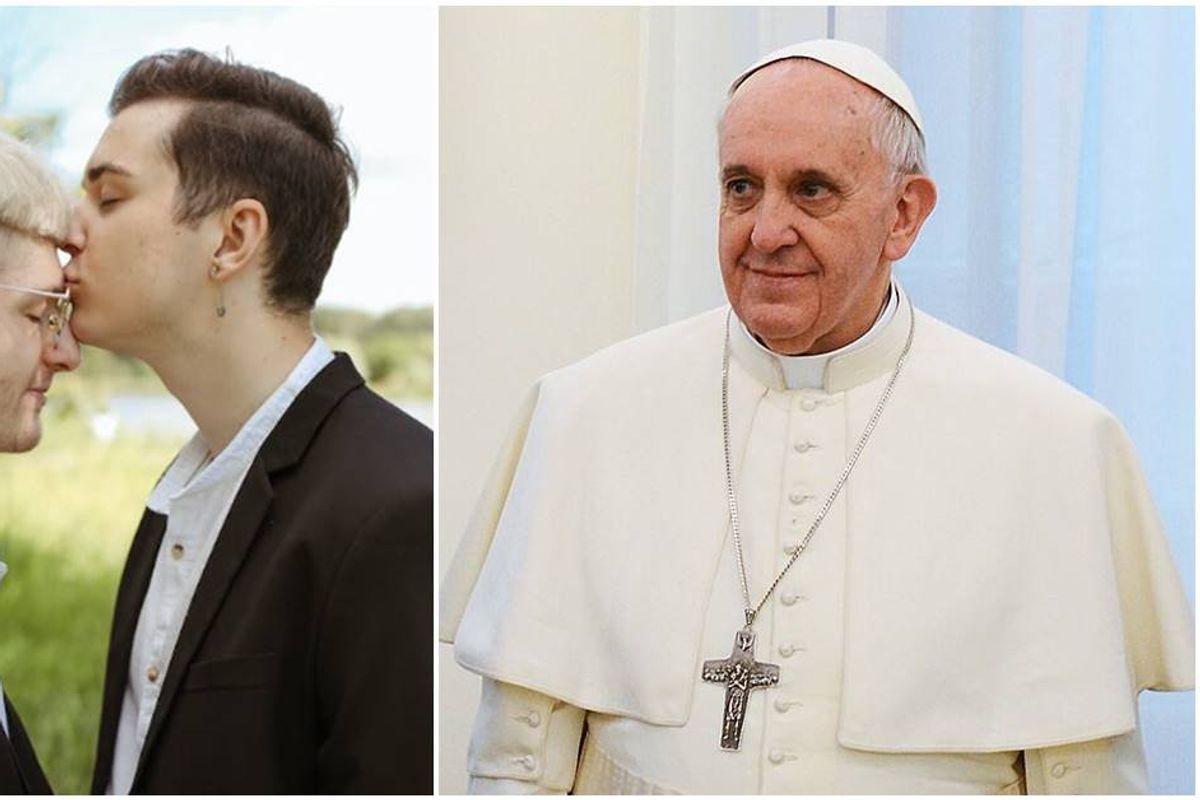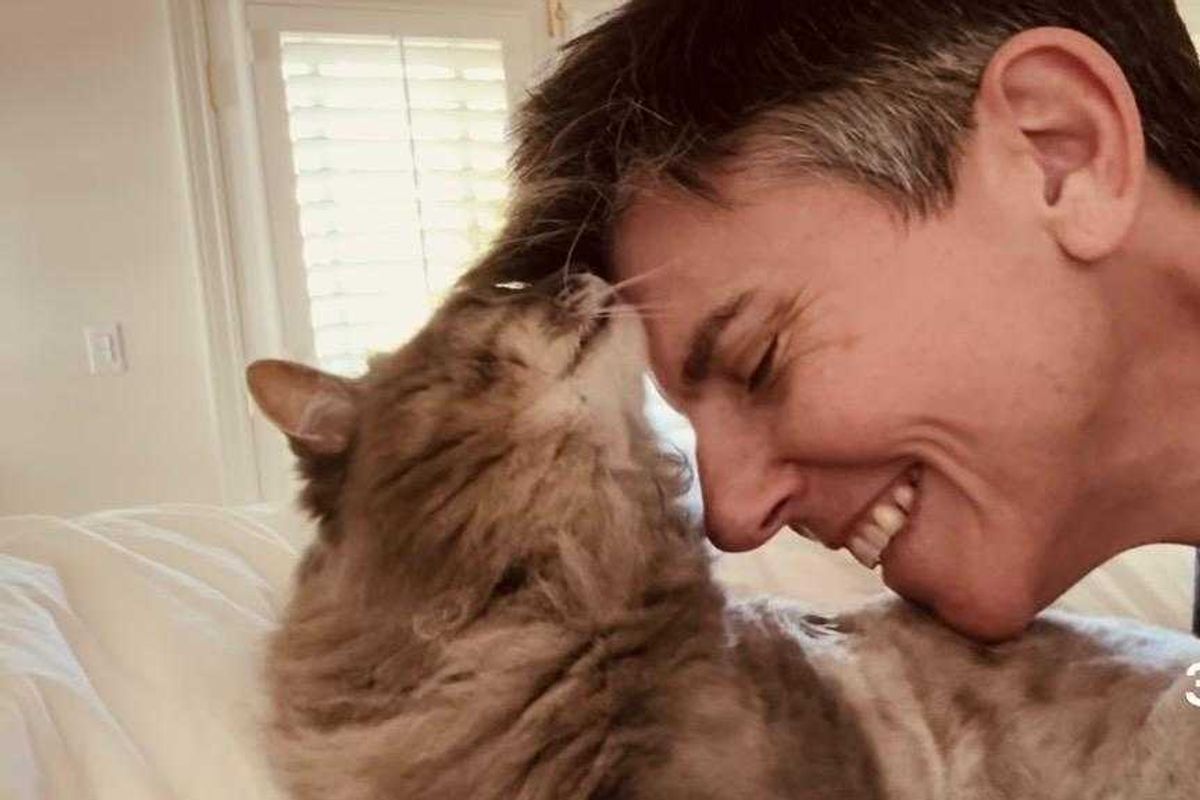Pope Francis is now allowing priests to bless same-sex couples but with one big stipulation
His logic makes a lot of sense.

A same-sex couple and Pope Francis.
Pope Francis has made a radical shift in Catholic Church doctrine by allowing priests to bless same-sex couples. The Vatican announced the change on Monday, December 18, in a document that outlined the new policy.
The change is one of Francis' most dramatic in his 10 years as pope.
However, even though the document feels like a softening of discriminatory policies within the Church, it’s also a clear statement that it still believes marriage is exclusively between a man and a woman. The policy also states that although priests can now bless same-sex couples, they must not be tied to any specific Catholic celebration or religious service or seen as a civil union ceremony.
The blessings may not involve clothing, gestures, or rituals that belong in a wedding.
The document is a reversal of the Vatican's Congregation for the Doctrine of the Faith’s 2021 statement that the Church cannot bless same-sex unions because "God cannot bless sin."
The Pope’s rationale for the change in doctrine is his belief that requesting a blessing, regardless of one’s lifestyle, shows an openness to a relationship with God, so it shouldn’t be denied.
"One should not prevent or prohibit the Church's closeness to people in every situation in which they might seek God's help through a simple blessing," the document from the Vatican's doctrine office says.
"Ultimately, a blessing offers people a means to increase their trust in God," the document continues. "The request for a blessing, thus, expresses and nurtures openness to the transcendence, mercy, and closeness to God in a thousand concrete circumstances of life, which is no small thing in the world in which we live."
"Thus, when people ask for a blessing, an exhaustive moral analysis should not be placed as a precondition for conferring it," the document said.
The Pope’s decision to allow priests to bless same-sex relationships is another bold move in a papacy defined by greater LGBTQ inclusivity. A few months into his papacy, when approached about a priest’s sexuality, Pope Francis asked, “Who am I to judge?” Earlier this year, in an interview with the Associated Press, the Pope said “Being homosexual isn’t a crime.” Last month, the Vatican said trans people can be baptized as godparents.
The decision has caused debate among leaders in the Catholic Church.
“The significance of this news cannot be overstated,” Francis DeBernardo of New Ways Ministry, which supports LGBTQ+ Catholics, said, according to NBC News. “It is one thing to formally approve same-gender blessings, which he had already pastorally permitted, but to say that people should not be subjected to “an exhaustive moral analysis” to receive God’s love and mercy is an even more significant step.”
However, the news is troubling to some conservative Catholics.
“The Vatican’s statement is, in my view, the most unfortunate public announcement in decades,” University of Notre Dame theologian Ulrich Lehner said in a statement. “Moreover, some bishops will use it as a pretext to do what the document explicitly forbids, especially since the Vatican has not stopped them before. It is—and I hate to say it—an invitation to schism.”
- This Netflix actor posted a moving video supporting same-sex marriage, and it went viral. ›
- Pope Francis shared a tender moment with a mentally disabled boy who wanted his skull cap ›
- Twitter users have some interesting thoughts about the pope's ... ›
- The Pope gave what might be the most beautiful defense of movies ever in unexpected speech - Upworthy ›



 Meatloaf was a staple dinner.
Meatloaf was a staple dinner. Spaghetti is still a classic.
Spaghetti is still a classic. Why were pork chops so popular?
Why were pork chops so popular?


 First Lady Jacqueline Kennedy greets guests before a reception for the Wives of American Society of Newspaper Editors Members.via
First Lady Jacqueline Kennedy greets guests before a reception for the Wives of American Society of Newspaper Editors Members.via  A gorilla walking on its knuckles. via
A gorilla walking on its knuckles. via 
 Cooking at home is almost always cheaper than eating out, and often significantly so.
Cooking at home is almost always cheaper than eating out, and often significantly so. Bulk spices often cost a fraction of what they cost in jars.
Bulk spices often cost a fraction of what they cost in jars. Growing your own food can save you money.
Growing your own food can save you money. Biking is free.
Biking is free. Public libraries are treasure troves of free items to borrow.
Public libraries are treasure troves of free items to borrow.